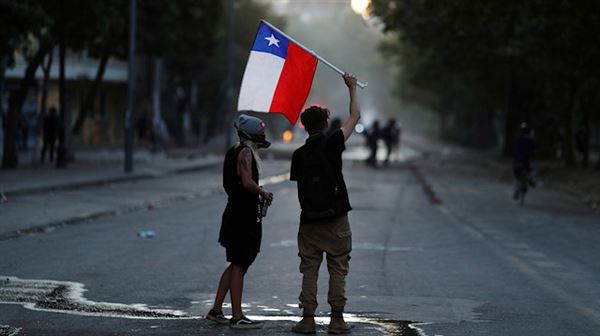Chilean President Sebastian Pinera on Wednesday announced that his country is pulling out of organizing Asia Pacific Economic Cooperation (APEC) summi
Chilean President Sebastian Pinera on Wednesday announced that his country is pulling out of organizing Asia Pacific Economic Cooperation (APEC) summit and UN Climate Change Conference amid escalating violence in country-wide protests.
At least 20 people were killed in violent protests in Chile that demand resignation of entire Cabinet of Pinera over rising living costs.
On Tuesday, the country’s Justice Ministry said a total of 1,218 people, including 745 security officers, were also injured since the start of large-scale demonstrations on Oct. 6.
Over 9,200 people were arrested across the Latin American nation during the unrest in connection with 49 destroyed subway stations and 26 buses set on fire.
The Chilean government declared a State of Emergency, which now covers the entire metropolitan region around the capital Santiago and other regions in the country.
It has also implemented curfews in multiple cities, which are enforced by security forces.
Arturo Merino Benitez International Airport in Santiago is currently experiencing widespread delays and flight cancellations which is expected to cripple the vibrant tourism industry that hosted more than 6 million tourists in 2017.
On Oct. 21, the U.S. Department of State updated the Level 2 Travel Advisory for Chile, where it said “protests occur with little regard for public safety, and have resulted in property damage, looting, arson, and transportation disruptions”.
– US’ Chile model collapsing
Demonstrating U.S.’s “ally” Chile as a model of success and prosperity to other South American countries for decades, U.S. officials were caught off-guard when deadly protests erupted across the country over low wages and increasing life expenses.
In line with its anti-democratic containment policy in Central and South America, the U.S. administrations have long shown a deep interest in the political and economic affairs of Chile.
U.S. President Richard Nixon played a key role in the overthrowing of democratically elected Chilean President Salvador Allende and replacing him with dictator Augusto Pinochet in a military coup in September 1973.
Pinochet, backed by the CIA and several U.S. administrations, remained in power until March 11, 1990.
He ruled the country in an iron-fist fashion, either killing or imprisoning hundreds of thousands of opponents to his dictatorship.
Extradition of Pinochet-era criminals sought
The U.S. is currently a party to over 100 bilateral extradition treaties, including a treaty with Chile which was signed on April 17, 1900, and entered into force on June 26, 1902.
Despite standing extradition treaties, which are mostly based on dual-criminality — extradition for actions considered crimes in both countries — the U.S. administrations have by a large extent failed to honor their obligations to ally countries.
In May 2016, Chile’s Supreme Court asked the U.S. to extradite three former agents who worked for Pinochet and are accused of the murder of a UN diplomat 40 years ago. The court asked the U.S. to hand over Chilean Armando Fernandez Larios, American Michael Townley and Cuban Virgilio Paz.
All three are wanted in Chile for the torture and killing of Spanish-Chilean citizen Carmelo Soria on July 14, 1976, among other crimes.
According to court documents, Larios arrived in the U.S. in 1987 “to provide information regarding his role and the role of his superiors in the 1976 [Directorate of National Intelligence]-sponsored car bombing in Washington, D.C. that killed the ex-Chilean Ambassador to the U.S., Orlando Letelier, and his assistant, Ronni Karpen Moffit.”
The court documents filed by the family of Letelier against Larios said he pled guilty to being an “accessory after the fact” in the 1976 bombing and entered into the federal Witness Protection Program in violation of the U.S. statute on the murder of foreign officials. He has “recently” left the protection program and lives in Miami, Florida.
Nearly four years after Chile’s extradition request from the U.S., federal court proceedings to officially handle the matter has not begun yet.
